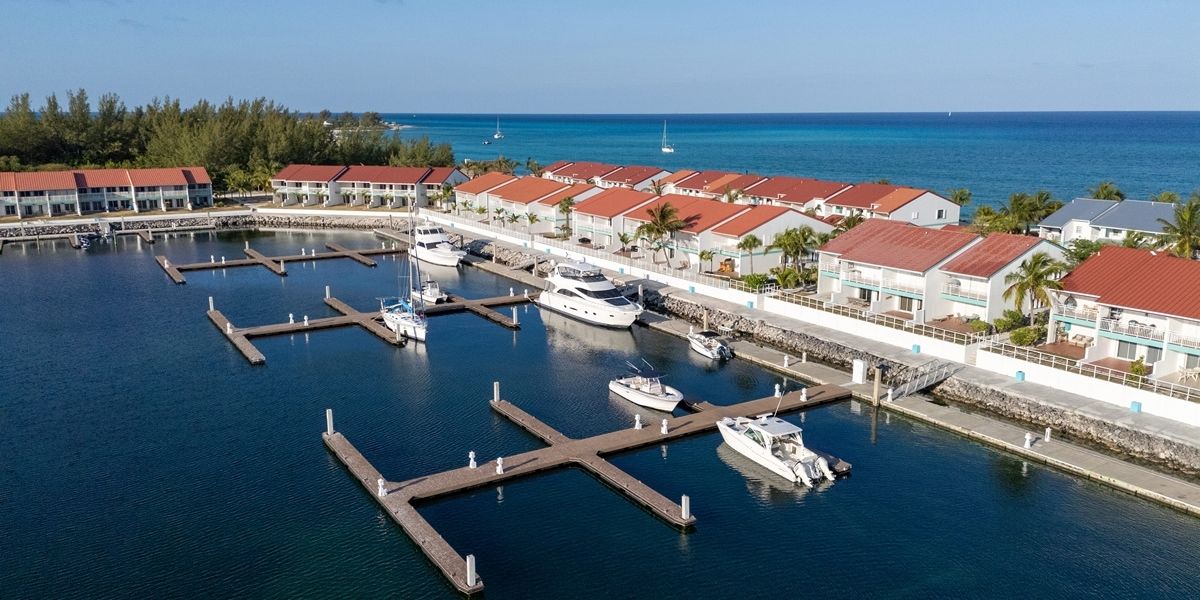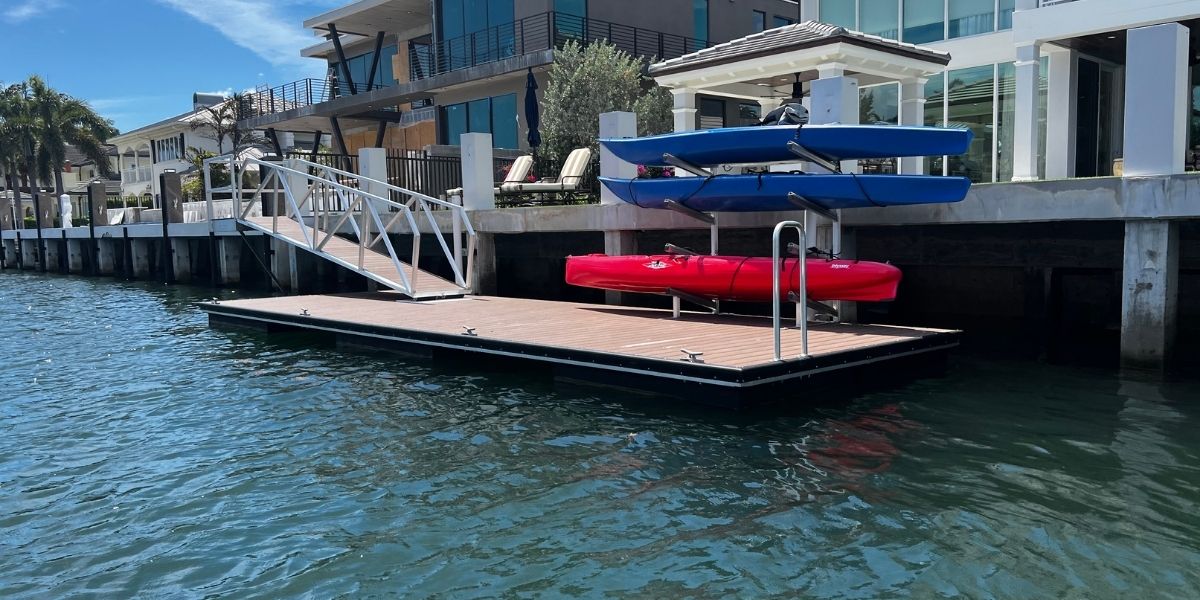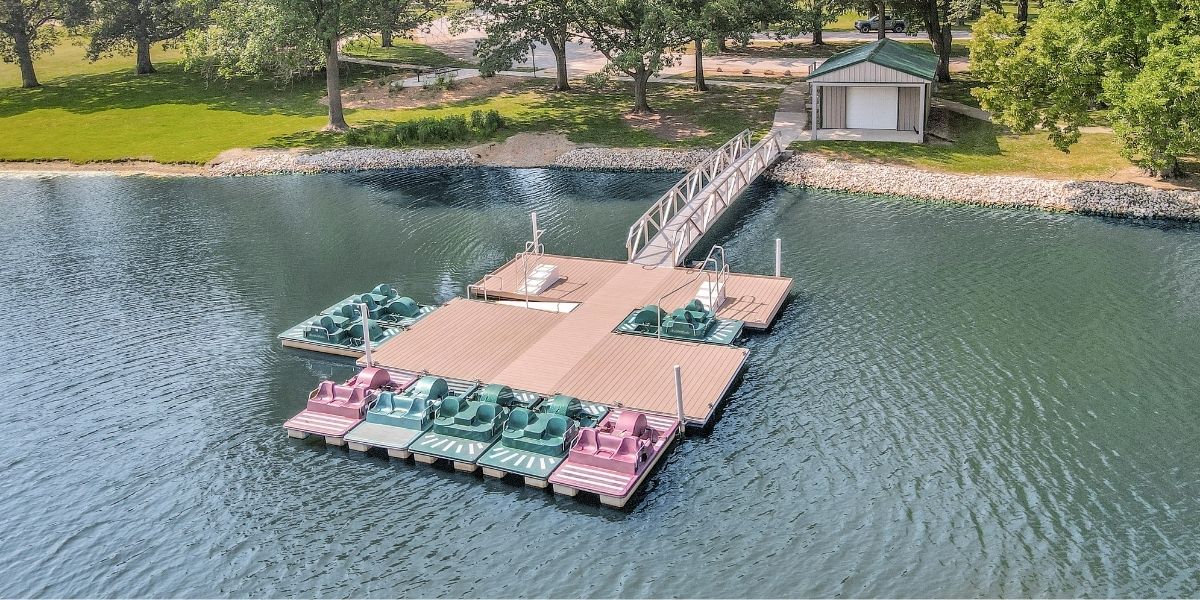
Floating Solutions: Why River Docks Demand a Different Approach to Design
Designing docks is not a one-size-fits-all process. The environment where the dock is installed plays a critical role in determining the best solution. When it comes to rivers, the design must accommodate unique challenges such as fluctuating water levels, strong currents, and floating debris. Unlike lakes or calm coastal areas, rivers are constantly changing, which means that traditional fixed docks might not be the most practical solution.
So, what’s the best way to handle these challenges? Floating docks are often the answer. In this article, we’ll explore why the best docks for rivers are floating docks and provide insights into what makes them ideal for these dynamic environments.
Why Do River Docks Require Special Designs?
Rivers are more unpredictable than lakes or sheltered coastal areas, meaning they come with their own set of challenges:
1. Fluctuating Water Levels
- Rivers can rise and fall rapidly due to seasonal rain, snowmelt, or even tides. Fixed docks are often submerged or left high and dry as water levels change, making them unreliable. For real-time river conditions and water level monitoring, visit the National Oceanic and Atmospheric Administration (NOAA).
- Solution: Floating docks adjust automatically with the changing water levels, ensuring they stay accessible at all times.
2. Strong Currents
- Unlike still lakes, rivers can have strong and unpredictable currents. These currents put a lot of pressure on fixed docks, leading to structural damage over time.
- Solution: Floating docks are designed to flex and move with the water flow, reducing the risk of damage from strong currents.
3. Floating Debris
- Rivers often carry logs, branches, and other debris, especially during floods or heavy rains. This debris can collide with fixed docks and cause significant damage.
- Solution: Floating docks are built with durable materials that can withstand impacts, and their flexibility helps absorb the shock from floating debris.
Why Floating Docks Are the Best Docks for Rivers
Floating docks offer numerous benefits that make them the ideal choice for river environments. If you’re considering adding a dock to your riverfront property, it’s essential to understand why floating docks stand out as the best option. Let’s dive deeper into why they are preferred, the advantages they offer, and the answers to common questions you may have.
1. Adaptability to Changing Water Levels
One of the biggest advantages of floating docks is their ability to adjust to changing water levels. Rivers can experience significant fluctuations in water height due to seasonal changes, heavy rainfall, or droughts. Floating docks are designed to move with the water, so you won’t have to worry about your dock being submerged or left high and dry.
Key Benefits:
- Continuous Accessibility: Floating docks rise and fall with the water, ensuring that you always have access to your boat, even during extremely high or low water levels.
- Reduced Maintenance: Unlike fixed docks, which can require costly repairs or modifications when water levels change, floating docks are designed to handle these shifts without the need for adjustments.
Common Questions:
- Q: Do floating docks work in areas with extreme water level changes?
A: Absolutely! Floating docks are built to handle significant variations in water levels, making them perfect for rivers that frequently change height.
2. Durability in Harsh Conditions
Rivers can be harsh environments, with strong currents and debris that could damage a traditional fixed dock. Floating docks are constructed using durable materials like aluminum, high-density polyethylene, or composite decking. These materials are chosen for their resistance to rust, corrosion, and wear.
Key Benefits:
- Strength & Flexibility: Floating docks are designed to withstand the pressure of strong river currents and impacts from floating debris.
- Lightweight Yet Strong: Materials like aluminum and polyethylene are both lightweight and incredibly strong, making the docks easy to maneuver but tough enough to last for years.
- Real-Life Example: AccuDock’s floating docks, for instance, are made with heavy-duty, American-made materials that ensure long-lasting performance even in the toughest river conditions.
Common Questions:
- Q: Can floating docks handle icy rivers?
A: Yes, floating docks are durable enough to handle icy conditions. However, if your river tends to freeze solid during winter, it’s recommended to detach and store your dock to prevent damage from ice expansion.
3. Minimal Environmental Impact
Environmental concerns are becoming increasingly important, especially when it comes to construction in natural waterways. Traditional fixed docks require deep pilings and heavy machinery, which can disrupt aquatic ecosystems and harm the environment. Floating docks are a much more eco-friendly option. For guidelines on responsible dock construction in regulated waterways, refer to the U.S. Army Corps of Engineers recommendations.
Key Benefits:
- Non-Invasive Installation: Floating docks don’t require drilling into the riverbed, so they won’t disturb fish habitats or underwater vegetation.
- Easily Removable & Relocatable: These docks can be easily removed or relocated, leaving little to no impact on the surrounding environment. This makes them an excellent choice for areas where environmental protection is a priority.
Common Questions:
- Q: Are floating docks better for protecting the river environment?
A: Yes! Floating docks are significantly less disruptive than traditional fixed docks, making them a great choice for eco-conscious property owners.
Additional Benefits of Floating Docks
- Versatile Design Options: Floating docks come in various shapes and sizes, making them customizable to fit your specific riverfront needs.
- Cost-Effective: While the initial investment may be comparable to fixed docks, the reduced maintenance and longer lifespan of floating docks often result in lower long-term costs.
- Easy Installation: These docks can be installed without heavy machinery, making the setup process faster and more cost-efficient.
Frequently Asked Questions:
- Q: How do floating docks handle high currents?
A: They are anchored securely, allowing them to remain stable even in fast-moving waters. Their design allows them to flex with the current rather than resist it, which prevents damage. - Q: Can floating docks support heavy loads?
A: Yes, many floating docks are built to handle substantial weight, such as multiple people, boats, or equipment. Be sure to check the weight capacity of your specific dock model.
In conclusion, floating docks are an ideal solution for rivers due to their adaptability, durability, and minimal environmental impact. They provide a practical, long-lasting option that can withstand the challenges of river environments while also being eco-friendly. If you’re looking for a dock that can handle whatever nature throws at it while preserving the natural beauty of your riverfront, a floating dock is the way to go.
Key Design Considerations for Floating River Docks
If you’re considering investing in a floating dock, here are some critical design factors to think about:
1. Anchoring Systems
Proper anchoring is essential for keeping your dock stable in fast-moving rivers. Depending on the conditions, you can choose from:
- Cable systems: Flexible but strong, ideal for moderate currents.
- Piling systems: Offer maximum stability for areas with strong currents.
- Stiff-arm systems: Great for rivers with occasional debris.
Common Questions:
- Q: How do I know which anchoring system is best for my river dock?
- A: It depends on your river’s flow rate, water level changes, and the type of debris. Consulting with a dock professional like AccuDock can help you choose the right solution.
2. Modular and Customizable Design
Each riverfront property is unique, so flexibility in design is crucial. AccuDock’s modular dock systems allow for:
- Customizable layouts to fit your property’s specific needs.
- Easy expansion if you need to add more sections in the future.
- Reconfigurable designs that can adapt to changing conditions.
Common Questions:
- Q: Can I add more sections to my floating dock later?
- A: Yes, modular docks are designed to be expanded or reconfigured as needed.
3. Non-Slip Surfaces for Safety
Safety is critical, especially if the dock will be used by the public. Non-slip surfaces help prevent accidents, particularly in wet or icy conditions. AccuDock offers:
- A variety of non-slip surface options.
- Custom textures that improve grip and reduce slipping.
Choosing the Right Floating Dock Solution for Your River Property
When looking for the best docks for rivers, it’s crucial to partner with a reputable manufacturer who understands river conditions. Here’s why AccuDock stands out:
- Quality Materials: Only the best American-made materials are used, ensuring durability and reliability.
- Custom Solutions: Each dock is tailored to your unique needs, guaranteeing a perfect fit.
- Expert Support: AccuDock’s team of professionals can guide you through every step, from design to installation.
Installation and Maintenance Tips for Floating River Docks
To get the most out of your floating dock, regular maintenance is key. Here’s how to keep your dock in top shape:
- Regular Inspections: Check for signs of wear, especially after storms or floods.
- Cleaning: Remove any accumulated debris to prevent damage.
- Seasonal Adjustments: Adjust your dock’s anchoring system if your area experiences significant seasonal changes.
Common Questions:
- Q: How often should I inspect my floating dock?
- A: At least once a season, and after any significant weather events.
Invest in the Best Docks for Rivers
Choosing a floating dock is more than just a functional upgrade for your riverfront property—it’s a smart investment in a long-lasting, adaptable solution. Whether you’re a homeowner looking to enhance your waterfront access or a marina operator needing a robust dock system, floating docks provide unmatched benefits.
Ready to find the perfect floating dock solution? Visit AccuDock to explore our customizable dock systems, or contact us today for a consultation.
By choosing AccuDock, you’re investing in a solution that will stand the test of time and deliver reliable performance for years to come.
AccuDock is a global leader in the design and manufacturing of Floating Docks
CALL 954.785.7557 OR EMAIL [email protected] FOR MORE INFORMATION









